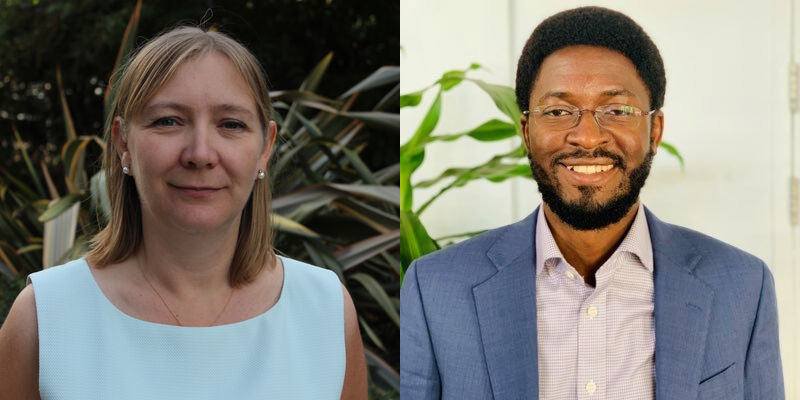Published: 12 December 2023
St George’s, University of London were represented on a national scale in late November as Director of Planning, Dr Julie Leeming, and Director of Digital Education, Dr Baba Sheba, played key roles at the Higher Education Strategic Planners Association (HESPA) Autumn ‘All-In’ Conference.
The Conference, held remotely over three days, related to strategic planning in the higher education sector. It brought together delegates from institutions across the country to engage in a variety of different workshops and plenaries centring on data, artificial intelligence (AI), student recruitment and financial planning.
Dr Leeming was responsible for chairing a Q&A with representatives from university league table compilers: the Guardian, the Complete University Guide, and the Daily Mail. Dr Sheba delivered the final conference’s closing plenary, Generative AI in Higher Education: Beyond Tools to Strategy.
 Dr Julie Leeming (left) and Dr Baba Sheba (right)
Dr Julie Leeming (left) and Dr Baba Sheba (right)
We spoke with both after the Conference to see how it went.
What kind of work does HESPA do?
Julie: “HESPA is the representative body for those working in strategy and planning in UK Higher Education. They provide a forum to allow networking, discussion, improvement and influence. They support the professional development of planners and influence HE by challenging policy, promoting awareness and understanding. They are particularly involved in statutory HE data used by Department for Education (DfE) and Office for Students (OfS). They also facilitate conversations beyond the Planning community.“
What, if any, has been your previous involvement with HESPA?
Julie: “They are my sector body and I’ve been on a HESPA sub-group for a while, called Higher Education Data Insight Group (HEDIG), but I am now also part of the HESPA Executive.“
How important is working alongside organisations like HESPA, both for St George’s specifically and the higher education sector more generally?
Julie: “HESPA is really important for St George’s as there are only two members of staff in the Planning team. This is my network of trusted people, whom I can liaise with about topics important to me. They are a representative body who will champion the voice of staff who take on the role of Planner in sector consultations.”
Julie, you chaired a Q&A with some of the UK’s foremost university league table compilers. What are some of the hottest topics and latest developments from that area?
Julie: “The compilers are trying to process how sector wide changes to student data reporting (to HESA/Jisc) might impact the metrics they create, as customers of that data. Most planners at the Q&A were really keen to get behind the methodologies the compilers use and understand them in more detail, as well as challenge some of their methodologies.”
Baba, you delivered the closing plenary on generative AI in a higher education setting. What are some key considerations for academic staff when integrating AI into teaching?
Baba: “We focused on priority considerations relating to assessment integrity, intellectual property, data protection, and reliance on “bad info” due to Generative AI’s potential to make things up. We also discussed ways of developing and AI strategy and how to integrate these into higher education focusing on goals and alignment with institutional strategy, use cases, enablers, and associated governance.”
What were some of the most interesting or crucial takeaways from the conference?
Baba: “What was clear from my engagement with colleagues during my session was the importance for a coordinated approach across the sector to ensure that we can use AI responsibly and ensure that accessibility for students is at the central to our considerations.”
Can you give us an example of either how you’re currently integrating AI into teaching at St George’s, or something you’d like to do in future?
Baba: “Integrating AI into our teaching and learning is a journey I’m excited about. Right now, we're laying the groundwork by creating awareness and understanding of how AI can make learning and teaching more effective. We've also introduced guidelines to ensure students use AI responsibly particularly when it comes to assessment.
"That's just the start - we're planning an upskilling programme that'll involve and include both students and staff. The idea is to make sure everyone's equipped to use AI in ways that genuinely enhance their work and studies.
"Looking ahead, I'm really keen to see AI-tailored learning experiences to each student's needs. Imagine a system that adapts to how you learn best - that's where we're heading. Beyond teaching, there's huge potential in student support. Examples include AI chatbots for round-the-clock help, AI for peer feedback, etc. We won’t just add AI into the mix; we’ll reshape how we think about education in an AI-driven future.”